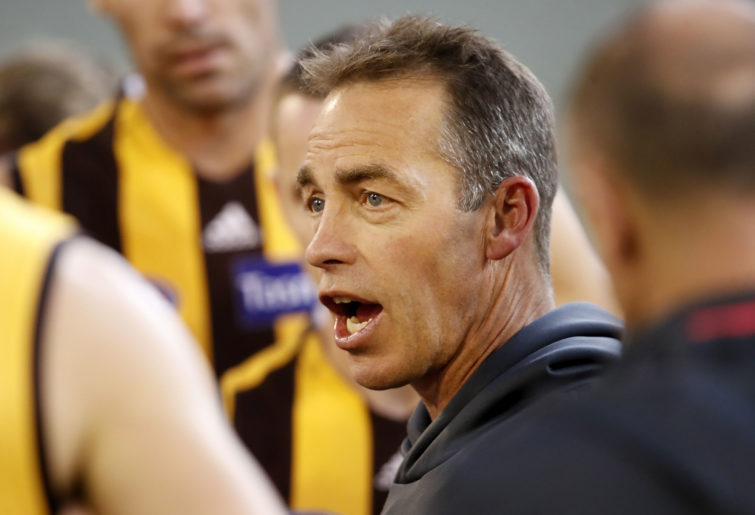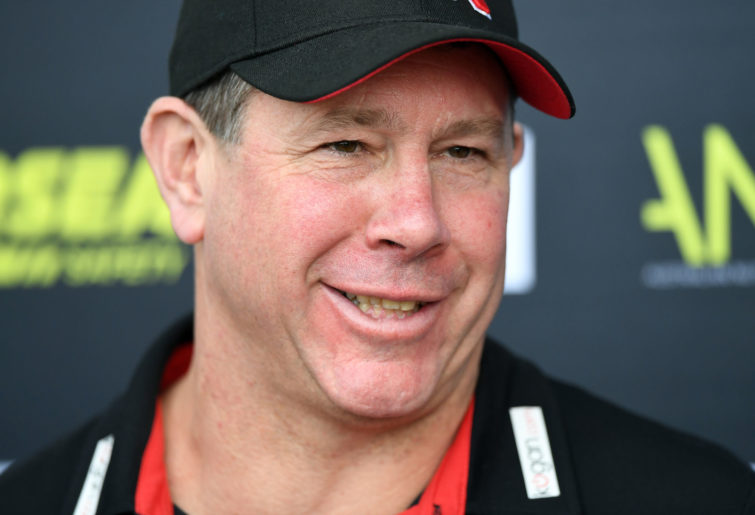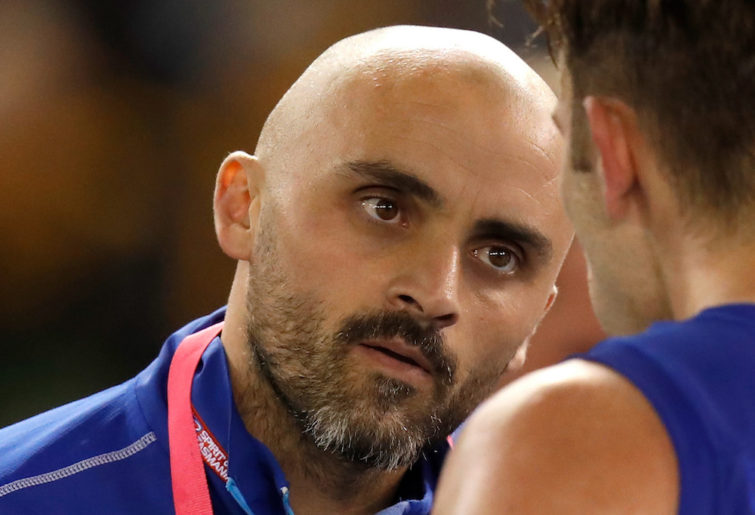'Needs to be something': Tex backs 'captain's call' after AFL admitted Crows were dudded... again
Adelaide's Taylor Walker has thrown his support behind a 'captain's call' in order to prevent umpiring blunders, which the Crows have been on the…
The AFL season culminated with more coaches coming under pressure to keep their jobs.
The coaches who were under scrutiny, at least according to the media, were John Worsfold, Leon Cameron, Ken Hinkley and Don Pyke. One coach lost their job – Ross Lyon was sacked by Fremantle despite having another year to run on his contract with the Dockers.
Lyon was sacked after his side’s Round 22 home loss to Essendon, after which they were no longer mathematically a chance for a finals berth. At least that substantiated the board acting on Fremantle’s poor form and taking what they deemed to be the appropriate action.
There has been a total of four interim coaches appointed this season including David Hale’s one game in charge of Fremantle. His single Round 23 match wasn’t sufficient to decipher where Hale would fit into the coaching ladder, but Ross Lyon still figures in the equation thanks to the four games he coached.
Looking at the ladder more broadly, the Western Bulldogs should be a finals threat if they can continue to implement the game style they’ve played in the five rounds analysed.
There were quite a few one-sided games late in the season, as is usually expected, but thankfully we also several matches in which the margin for error was very small, making it hard to rank coaches. This season is extremely unpredictable based solely on Rounds 19-23, with only one team unbeaten in the last five matches of the home-and-away season, that side being Richmond.
At the other end of the ladder Melbourne and Gold Coast failed to register a win, but both came close late in the season, indicating the competition is in good stead.
1. Luke Beveridge (Western Bulldogs)
The Bulldogs were successful in four out of five games. Their only loss came in Round 20 against Brisbane away in a close contest. Their four wins were relatively comfortable; they were victorious in each by at least four goals and scored at least 100 points in each.
2. Damien Hardwick (Richmond Tigers)
Despite winning all of their games over the five weeks this coaching ladder was formulated, their final two games during this period were against top-eight teams, and they passed the tests successfully. Richmond played well and were brilliantly coached, but Hardwick is ranked second on the list as Richmond failed to kick over one hundred points in the five matches and Richmond’s game style wasn’t quite as free flowing as the Western Bulldogs, if only slightly.
3. Chris Fagan (Brisbane Lions)
Brisbane may have won four of their five games, but the match they lost was against a top-four team, albeit by under five goals, in Round 23, and they were lucky to beat minor premiers Geelong, after trailing at all three breaks, coming back in the final term to win by a point. Brisbane proved why they are a top-four team in most of their performances, though they do have weaknesses that can be exploited in the finals.
4. Alastair Clarkson (Hawthorn Hawks)
Hawthorn failed to win in Rounds 19 and 20 but were successful in the following three. They can be forgiven for losing in Round 19 against Brisbane, but North Melbourne also beat Hawthorn – though the Kangaroos can admittedly be a dangerous team to play against when at their best. The Hawks beat two top-eight teams, Greater Western Sydney and the West Coast Eagles, which shows there is light at the end of the tunnel as far as success is concerned, perhaps as early as 2020.

(Dylan Burns/AFL Photos)
4. Adam Simpson (West Coast Eagles)
West Coast had mixed performers. They managed to win in Rounds 19, 20 and 21, but they lost their final two matches. They nearly beat Richmond in Round 22, losing by just one goal, and in Round 23 Adam Simpson was outcoached by rival manager Alastair Clarkson. The loss cost them a top-four finish and the double chance, so they have no margin for error in the final series.
6. Chris Scott (Geelong Cats)
Geelong were reasonably consistent between Round 19 and Round 23. Two of their three wins were comprehensive; they conceded only one goal against North Melbourne in Round 21, and in Round 23 they won by over ten goals against Carlton. Chris Scott would have been higher on the ladder, but Geelong lost to Fremantle, which means they underachieved in Round 20. They also lost to Brisbane, a game they should have easily won after leading at every change.
7. Nathan Buckley (Collingwood Magpies)
Collingwood won four of their five games, but they were deplorable in Rounds 19 and 21. It was the manner in which they lost to Richmond in Round 19 that was most concerning, kicking just nine goals, and they were extremely fortunate to claim victory in their Round 21 game against Melbourne. Buckley scrapes into the top-eight coaches thanks to his overall results.
8. Brett Ratten (St Kilda Saints)
St Kilda may have won only two of their five games, but I don’t think Brett Ratten could have done much better as far the game plan he implemented. The Saints beat Melbourne in Round 19 and Fremantle narrowly in Round 21. St Kilda’s biggest problem was their kicking for goal – they kicked more goals than behinds in just two of their matches. In Round 20 they only had two fewer scoring shots than Adelaide, while in Round 22 the deficit was just ten points against Carlton. Remarkably, in Round 23 St Kilda had the same number of scoring shots as Sydney despite losing the game comprehensively.

(AAP Image/Julian Smith)
9. Ken Hinkley (Port Adelaide Power)
Port Adelaide won three of five games, with their wins coming against an inconsistent Essendon, Sydney and Fremantle. Despite being on the right side of the ledger as far as their win-loss record is concerned, they lost a winnable game against Greater Western Sydney by a point despite having four more scoring shots in Round 19. North Melbourne kicked 22 goals against Port Adelaide in Round 22, the week after they kicked just one goal against Geelong, which was rather embarrassing for Ken Hinkley and the club as a whole.
10. David Teague (Carlton Blues)
It was unanimously agreed by the football world that David Teague should be appointed Carlton coach after coaching well during the Round 12-18 window, but it was a different story between Round 19 and Round 23, with the Blues victorious in just two of their five games. Their losses came against three top-five teams – West Coast, Richmond and Geelong – which is why Teague isn’t lower on the ladder, especially as only one of those games was a thrashing, in Round 23 away against Geelong. There is definitely room for improvement in Carlton’s game style, and it will interesting to see whether the plan implemented by Teague stacks up in season 2020.
11. John Longmire (Sydney Swans)
Sydney played some decent footy in Rounds 22 and 23, but it was against Melbourne and St Kilda respectively. No disrespect to those two teams, but they didn’t have the best of seasons. Round 23 substantiates why John Longmire wasn’t in the top eight on the coaching ladder. As stated earlier, Sydney beat St Kilda comprehensively, but they had the same number of scoring shots. It was a failure that they lost their first three games of the five analysed, especially considering they lost comprehensively to Port Adelaide in Round 21.
11. Rhyce Shaw (North Melbourne Kangaroos)
It’s incredible Rhyce Shaw is ranked outside of the top eight coaches considering North Melbourne won three out of five games, but they were uncompetitive against West Coast in Round 19 and kicked just one goal against Geelong in Round 21. They narrowly beat Melbourne in Round 23 and were victorious against Hawthorn and Port Adelaide, but all three finished outside the eight. There is definitely potential as far as Shaw’s coaching ability is concerned, but he will want to minimise the comprehensive losses his side suffer in the 2020 season if he wants to be successful.

(Michael Willson/AFL Photos via Getty Images)
13. Don Pyke (Adelaide Crows)
Adelaide lost four of five games, but those defeats came against in-form teams. Carlton were playing good footy in Round 19, they nearly beat West Coast in Perth in Round 21, against Collingwood they were competitive in the first half before being comprehensively beaten in the final two quarters and they did well to limit the damage inflicted by the unstoppable Bulldogs to under six goals. Adelaide did manage to beat St Kilda, but Don Pyke’s viability is coach is still being heavily scrutinised.
14. Ross Lyon (Fremantle Dockers)
Fremantle won only one of the four games Lyon coached, but it was against Geelong in Round 20. They nearly beat St Kilda in Round 21, which may have helped them make the finals, but it wasn’t to be. In Round 19 the Dockers were obliterated by the resurgent Bulldogs, and in Lyon’s last game they lost to an Essendon team with a point to prove, the Bombers having been thrashed by the Bulldogs the previous round.
15. Leon Cameron (Greater Western Sydney)
They may have won three of their five games, but their performances overall were unimpressive. In Round 19 they beat Port Adelaide by a point and in Round 20 they defeated Sydney by just two points. Their other win came in Round 23 against a Gold Coast team that got within ten points of Greater Western Sydney in the third quarter. Their two losses came against Hawthorn and the Bulldogs, and they were obliterations.
15. John Worsfold (Essendon Bombers)
Despite winning two of their five games, Essendon didn’t play their best footy between Rounds 19 and Round 23. They narrowly beat Gold Coast and won against Fremantle in Ross Lyon’s last game as coach, but they were smashed by the Western Bulldogs and Port Adelaide. In Round 23 the Bombers were competitive to lose by less than two goals against Collingwood, lifting morale slightly before finals.
17. Stuart Dew (Gold Coast Suns)
The Gold Coast suggested they could improve next season when they almost claimed four points against Essendon. They were largely uncompetitive, but they got within ten points of Greater Western Sydney in Round 23 in the third quarter. Unfortunately the Suns were predominantly uncompetitive, which will hopefully change soon given they won three games earlier in the season, but it’s difficult to argue with their lack of results.
18. Simon Goodwin (Melbourne Demons)
Melbourne were unsuccessful in all five games, though they should have beaten Collingwood and North Melbourne. The Demons have gone from making a preliminary final in 2018 to losing their last five games in 2019, and pressure will be on Simon Goodwin in 2020 to keep his job if things don’t improve.